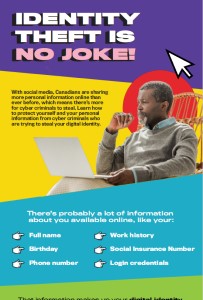
With social media, Canadians are sharing more personal information online than ever before, which means there's more for cyber criminals to steal. Learn how to protect yourself and your personal information from cyber criminals who are trying to steal your digital identity.
There's probably a lot of information about you online, like your:
- full name
- birthday
- phone number
- work history
- social insurance number
- login credentials
That information makes up your digital identity. And you might be sharing it without even realizing.
Only 17% of Canadians feel it's likely that their personal information will be compromised from a cyber threat Note i
But 42% of Canadians have experienced at least one type of cyber security threat within the past year Note ii
Whenever you use
- social media
- financial services
- cloud services
- web browsers
- online databases
- online subscription
your data is collected.
76% of Canadians rank identity theft as their biggest concern when thinking about cyber security Note iii
And it should be.
Cyber threats can leave your data and identity exposed to:
- Phishing
- Phony messages designed to trick you into clicking links or sharing information.
- Data breaches
- Information stolen from companies you've shared information with
- Social engineering
- Like phishing, but more personalized to manipulate you
- Deepfakes
- Media created to impersonate you using your face or voice
Protect your digital identity
- Secure your Wi-Fi
- Use strong passphrases or passwords
- Limit how much personal information you share online
- Install anti-virus software
- Update devices and software often
- Watch out for suspicious activity on your accounts
Get more tips to protect yourself and your devices at GetCyberSafe.ca.
